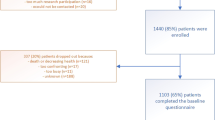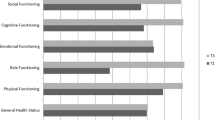Abstract
Goals of work
The aims of this secondary analysis were to determine the prevalence of nutrition impact symptoms in medical oncology patients at 1, 6, and 12 months after commencement of chemotherapy and to investigate the relationship of these symptoms to quality of life (QoL) and performance status.
Materials and methods
A prospective longitudinal survey was conducted in 219 medical oncology patients who had commenced chemotherapy in the past month. The Rotterdam Symptom Assessment scale assessed the number and distress level of symptoms. The association between symptoms and global QoL and performance status as measured by the Life Satisfaction Scale was investigated.
Main results
Symptom prevalence as determined by the proportion of patients experiencing at least one nutrition impact symptom was 79% and 72% at 1 and 6 months after starting chemotherapy. Even at 12 months, symptom prevalence was 46%. The most common symptoms included dry mouth, nausea, and constipation with the most distressing symptoms reported as dry mouth, diarrhea, and stomach pain. A higher number of symptoms was associated with lower QoL (T1: r = −0.35, n = 217, P < 0.05; T2: r = −0.406, n = 194, P < 0.001; T3: r = −0.353, n = 157, P < 0.001). Patients experiencing more symptoms were more likely to have lower performance status at T2 and T3 (T2: n = 189, P = 0.019; T3: n = 143, P = 0.003).
Conclusion
Nutrition impact symptoms were commonly experienced, even 12 months following commencement of chemotherapy, and were associated with poorer QoL and performance status. This highlights the importance of early identification and management of nutrition impact symptoms with adequate follow-up in order to provide optimal care for people with cancer.
Similar content being viewed by others
References
Argiles JM (2005) Cancer-associated malnutrition. Eur J of Oncol Nursing 9:S39–S50, Medline. DOI 10.1016/j.ejon.2005.09.006
Bauer J, Capra S, Ferguson M (2002) Use of the scored patient-generated subjective global assessment as a nutrition assessment tool in patients with cancer. Eur J Clin Nutr 56:779–785, Medline. DOI 10.1038/sj.ejcn.1601412
Capra S, Ferguson M, Ried K (2001) Cancer: impact of nutrition intervention outcome-nutrition issues for patients. Nutrition 17(9):769–772, Medline. DOI 10.1016/S0899-9007(01)00632-3
Clinton M, Lunney P, Edwards H, Weir D, Barr J (1998) Perceived social support and community adaptation in schizophrenia. J Adv Nurs 27:955–965, Medline. DOI 10.1046/j.1365-2648.1998.t01-1-00573.x
Donnelly S, Walsh D (1995) The symptoms of advanced cancer. Semin Oncol 22:67–72, Medline
Grosvenor M, Bulcavage L, Chlebowski R (1989) Symptoms potentially influencing weight loss in a cancer population. Cancer 63:330–334, Medline. DOI 10.1002/1097-0142(19890115)63:2<330::AID-CNCR2820630221>3.0.CO;2-U
Gupta D, Lis CG, Granick J, Grutsch JF, Vashi PG, Lammersfeld CA (2006) Malnutrition was associated with poor quality of life in colorectal cancer: a retrospective analysis. J of Clin Epidemiology 59(7):704–709, Medline. DOI 10.1016/j.jclinepi.2005.08.020
Isenring E, Bauer J, Capra S (2003) The scored Patient-Generated Subjective Global Assessment (PG-SGA) and its association with quality of life in ambulatory patients receiving radiotherapy. Eur J of Clin Nutr 57:305–309, Medline. DOI 10.1038/sj.ejcn.1601552
Isenring E, Capra S, Bauer J (2004) Nutrition intervention is beneficial in oncology outpatients receiving radiotherapy to the gastrointestinal or head and neck area. Br J Cancer 91:447–452, Medline. DOI 10.1038/sj.bjc.6601962
Isenring E, Cross G, Daniels L, Kellett E, Koczwara B (2006) Validity of the malnutrition screening tool as an effective predictor of nutritional risk in oncology outpatients receiving chemotherapy. Support Care Cancer 14:1152–1156, Medline. DOI 10.1007/s00520-006-0070-5
Khalid U, Spiro A, Baldwin C, Sharma B, McGough C, Norman AR et al (2007) Symptoms and weight loss in patients with gastrointestinal and lung cancer at presentation. Support Care Cancer 15:39–46, Medline. DOI 10.1007/s00520-006-0091-0
Komurcu S, Nelson KA, Walsh D (2000) The gastrointestinal symptoms of advanced cancer. Support Care Cancer 9:32–39, DOI 10.1007/s005200000164
Laviano A, Meguid MM (1996) Nutritional issues in cancer management. Nutrition 12(5):358–371, Medline. DOI 10.1016/S0899-9007(96)80061-X
Marin Caro MM, Laviano A, Pichard C (2007) Impact of nutrition on quality of life during cancer. Curr Opin Clin Nutr Metab Care 10(4):480–487, Medline. DOI 10.1097/MCO.0b013e3281e2c983
Marin Caro MM, Laviano A, Pichard C (2007) Nutritional intervention and quality of life in adult oncology patients. Clin Nutr 26(3):289–301, Medline. DOI 10.1016/j.clnu.2007.01.005
Mercadante S (1996) Nutrition in cancer patients. Support Care Cancer 4:10–20, Medline. DOI 10.1007/BF01769869
Olsson U, Bosaeus I, Svedlund J, Bergbom I (2007) Patients’ subjective symptoms, quality of life and intake of food during the recovery period 3 and 12 months after upper gastrointestinal surgery. Eur J of Cancer Care 16(1):74–85, Medline. DOI 10.1111/j.1365-2354.2006.00709.x
Ottery FD (2000) Patient-generated subjective global assessment. In: McCallum P, Polisena C (eds) The clinical guide to oncology nutrition. The American Dietetic Association, Chicago, pp 11–23
Ravasco P, Monteiro-Grillo I, Camilo ME (2003) Does nutrition influence quality of life in cancer patients undergoing radiotherapy. Radiotherapy and Oncol 67(2):213–220, Medline. DOI 10.1016/S0167-8140(03)00040-9
Ravasco P, Monteiro Grillo I, Vidal PM, Camilo ME (2004) Cancer: disease and nutrition are key determinants of patients’ quality of life. Support Care Cancer 12:246–252, Medline. DOI 10.1007/s00520-003-0568-z
Ravasco P, Monteiro-Grillo I, Vidal P, Camilo ME (2005) Impact of nutrition on outcome: a prospective randomized controlled trial in patients with head and neck cancer undergoing radiotherapy. Head Neck 27:659–668, Medline. DOI 10.1002/hed.20221
Read JA, Choy SB, Beale P, Clarke SJ (2006) An evaluation of the prevalence of malnutrition in cancer patients attending the outpatient oncology clinic. Asia-Pacific J of Clin Oncol 2(2):80–86, DOI 10.1111/j.1743-7563.2006.00048.x
Schuit KW, Sleijfer DT, Meijler WJ, Otter R, Schakenraad J, Van den Bergh FCM, Jong BM (1998) Symptoms and functional status of patients with disseminated cancer visiting outpatient departments. Journal of Pain and Symptom Management 16:290–297, Medline. DOI 10.1016/S0885-3924(98)00091-8
Stein KD, Denniston M, Baker F, Dent M, Hann DM, Bushhouse S, West M (2003) Validation of a modified Rotterdam symptom checklist for use with cancer patients in the United States. Journal of Pain and Symptom Management 26(5):975–989, Medline. DOI 10.1016/S0885-3924(03)00321-X
Wengstrom Y, Haggmark C, Strander H, Forsberg C (2000) Perceived symptoms and quality of life in women with breast cancer receiving radiation therapy. Eur J of Oncol Nursing 4(2):78–88, Medline. DOI 10.1054/ejon.1999.0052
Acknowledgements
This manuscript was written during an independent study unit as part of the Bachelor of Nutrition and Dietetics degree, Queensland University of Technology and the project supervised as part of an NHMRC Australian Clinical Training Fellowship (ID:324777).
Author information
Authors and Affiliations
Corresponding author
Additional information
HT was the main author of the manuscript and assisted in statistical analysis and interpretation. EI supervised the project and assisted in statistical analysis, interpretation, and writing the manuscript. PY initiated the study, supervised the project, and assisted in writing the manuscript.
Rights and permissions
About this article
Cite this article
Tong, H., Isenring, E. & Yates, P. The prevalence of nutrition impact symptoms and their relationship to quality of life and clinical outcomes in medical oncology patients. Support Care Cancer 17, 83–90 (2009). https://doi.org/10.1007/s00520-008-0472-7
Received:
Accepted:
Published:
Issue Date:
DOI: https://doi.org/10.1007/s00520-008-0472-7




